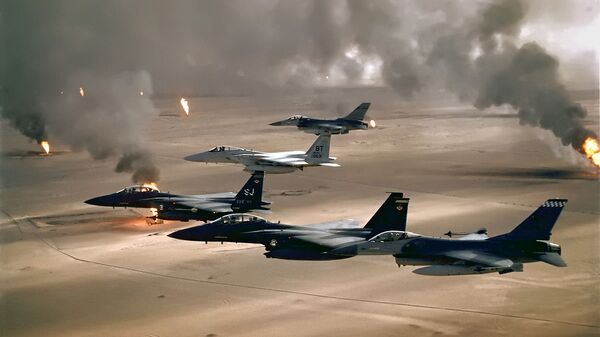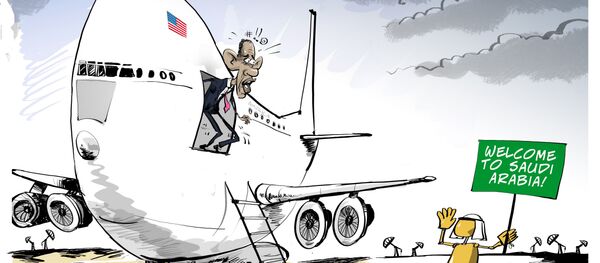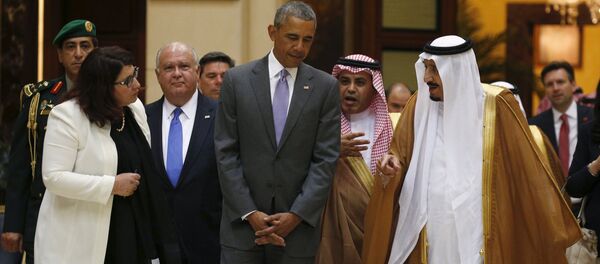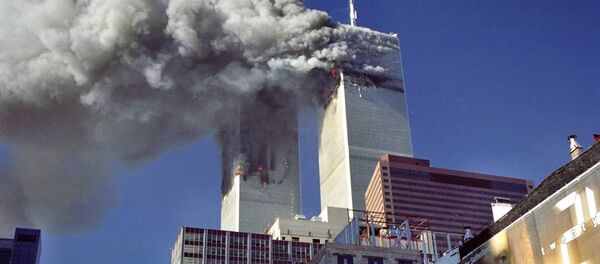The diplomatic clash, commentators suggest, stems from policy differences in the region, with the Obama administration stepping back from efforts against the Syrian government, which Riyadh desperately wants toppled, and attempting to normalize relations with Iran, the Saudis' main enemy in the region. Another sticking point includes a bill making its way through Congress which would allow 9/11 victims to sue foreign governments, including the Saudis. The bill has enraged Riyadh to the point where it has threatened to sell off billions in US assets if the bill becomes law.
But as bad as things are now, they have a long way to go before reaching the lows of the oil crisis years of the 1970s, according to Michael Peck, contributing writer for US foreign policy magazine The National Interest.
In a timely piece on a very important moment in the history of US-Saudi relations, Peck recalls that low point came in the early 1970s, when the United States, embargoed by Arab oil producers including Saudi Arabia, for aiding Israel during the Yom Kippur War of 1973, actively considered a military intervention on the Arabian Peninsula to stop the economic bleeding.
"Though no explicit military plan was mentioned, the documents do show that British leaders were worried by a conversation between US Secretary of Defense James Schlesinger and Lord Cromer, the British ambassador to the United States."
"Schlesinger told Cromer that 'it was no longer obvious to him that the US could not use force. An interesting outcome of the Middle East crisis was that the notion of the industrialized nations being continuously submitted to whims of the underpopulated under-developed countries, particularly of the Middle East, might well change public perceptions about the use of the power that was available to the US and the Alliance.'"
Ultimately, Peck recalled, Britain's Prime Minister at the time, Edward Heath, "was worried enough by Schlesinger's tough talk, as well as hints of military action from Secretary of State Henry Kissinger," that he would "order a British intelligence estimate of US intentions."
"The report concluded that the United States 'might consider it could not tolerate a situation in which the US and its allies were at the mercy of a small group of unreasonable countries. We believe the American preference would be for a rapid operation conducted by themselves to seize oilfields…The force required for the initial operation would be of the order of two brigades, one for [the] Saudi operation, one for Kuwait and possibly a third for Abu Dhabi.'"
Britain's Joint Intelligence Committee concluded that the 28 billion tons-worth of reserves would be sufficient for meeting the energy demands of the US and its allies, but added that US occupation would have to last at least a decade, until such time as the West could develop alternative energy sources.
Furthermore, the report said, the invasion "would result in the 'total alienation' of the Arabs and much of the Third World." The Soviet Union's reaction also worried planners, though they did not expect a military response.
"America," Peck contends, "could have seized the oil fields with little problem. With the US military now out of Vietnam, a couple of divisions could have been spared for the Middle East while still maintaining a force to guard against Soviet attack in Europe. In 1973, the Saudis lacked all those high-tech American and European weapons, such as F-15s and AWACs, that the oil windfall would buy them a few years later."
Nevertheless, the journalist noted, the US occupation would not be a cakewalk, as demonstrated by the War in Iraq thirty years later. "The conditions were far different: Saudi Arabia had a much smaller population than Iraq, and the US goal would have been occupation of natural resources rather than regime change. Yet what might have ensued was an early version of the War on Terror."
"There was no Al-Qaeda, and Osama bin Laden was just a spoiled Saudi rich kid. But in the early 1970s, there was Arab nationalism, Pan-Arabism, Arab leftists who still believed in Communism, and a plethora of terrorist groups in the Middle East, Europe and Japan just looking for a cause to fight for. Instead of suicide bombers, there would have been guerilla warfare, terrorism and perhaps even a pre-bin Laden surge in Islamic fundamentalism."
Ultimately, Peck notes, "in the end, just like Iraq, the question would have remained: What do you do with the territory after you've taken it?" The best solution, the journalist suggests, is the same today as it was back then: "find another energy source that doesn't rely on foreign oil."






